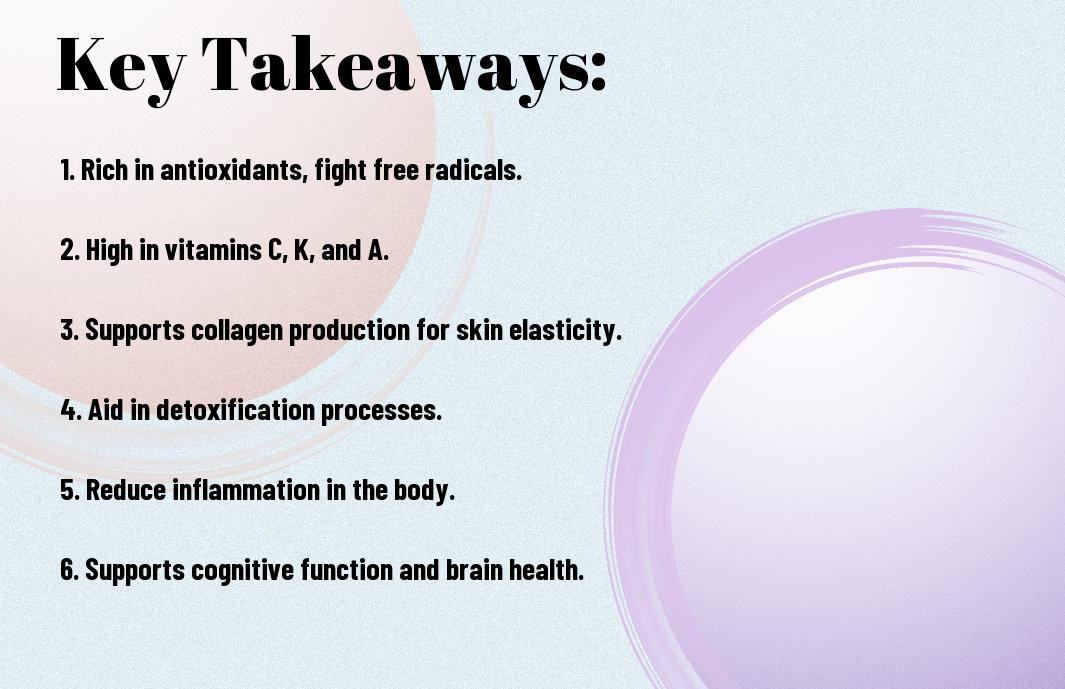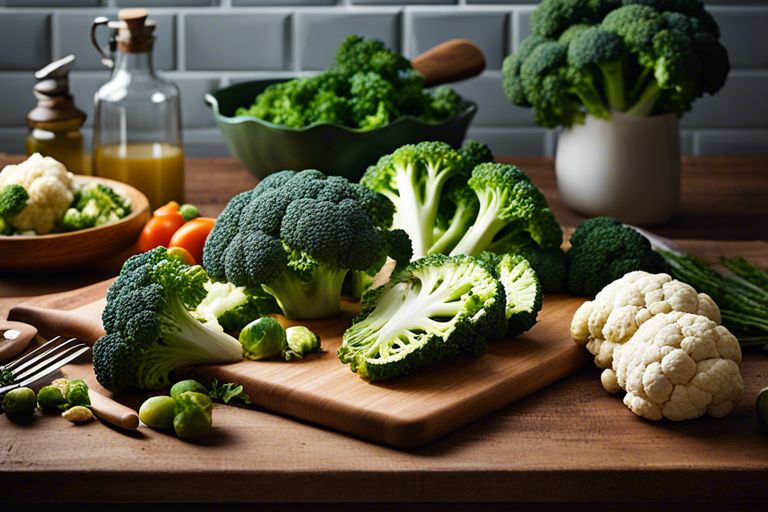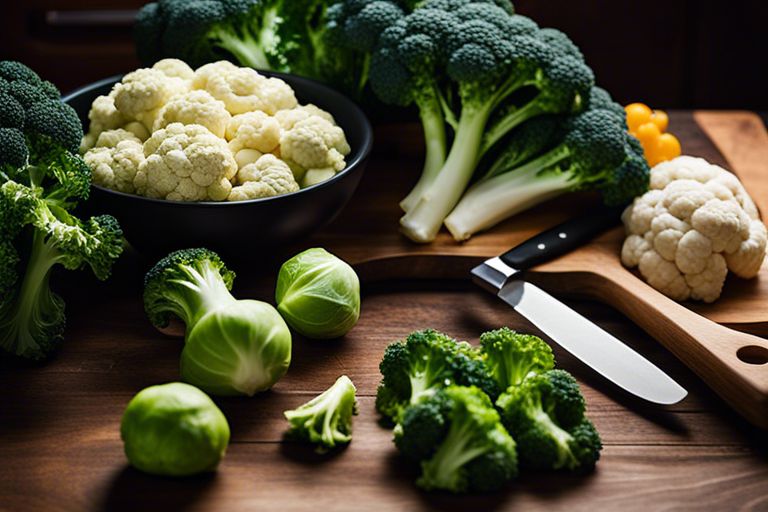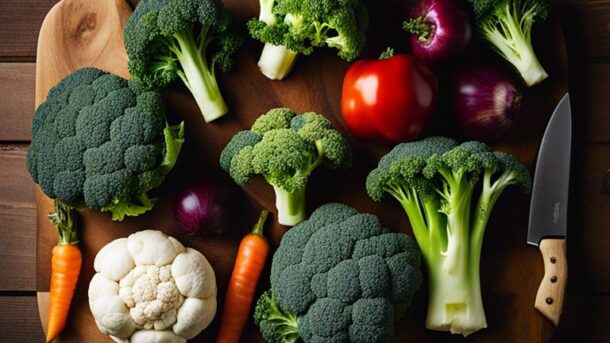Embrace the power of cruciferous vegetables like broccoli and kale to enhance your anti-aging journey. These nutrient-packed greens are rich in antioxidants, vitamins A, C, and K, as well as necessary minerals like potassium and calcium. By incorporating these superfoods into your diet, you can combat inflammation, boost collagen production, and protect your skin from oxidative stress, ultimately promoting a youthful and radiant glow. Discover the delicious ways these cruciferous veggies can help you age gracefully and healthily.
Key Takeaways:
- Antioxidants: Cruciferous vegetables such as broccoli and kale are rich in antioxidants that help to combat oxidative stress, which is a key contributor to aging.
- Anti-inflammatory properties: These vegetables contain compounds that have anti-inflammatory properties, reducing the risk of chronic diseases associated with aging.
- Detoxification support: Cruciferous vegetables support the body’s natural detoxification processes, helping to eliminate toxins and promote overall health, which is necessary for anti-aging.


The Science Behind Anti-Aging
Oxidative Stress and Cellular Damage
The process of aging is closely tied to oxidative stress and cellular damage. As you age, your body experiences an imbalance between free radicals and antioxidants. Free radicals, or reactive oxygen species, can cause damage to your cells, proteins, and DNA, leading to accelerated aging and the development of age-related diseases. Cruciferous vegetables like broccoli and kale contain compounds that can help combat oxidative stress and protect your cells from damage.
The Role of Antioxidants in Combating Aging
Incorporating cruciferous vegetables into your diet is crucial for combating aging. These vegetables are rich in antioxidants, such as vitamin C, E, and beta-carotene, as well as powerful phytochemicals like sulforaphane and quercetin. Antioxidants work by neutralizing free radicals, reducing oxidative stress, and preventing cellular damage. By including broccoli, kale, and other cruciferous veggies in your meals, you can support your body’s natural defense mechanisms against aging and promote overall health.
Behind the scenes, antioxidants play a vital role in protecting your cells from the harmful effects of free radicals. When free radicals outnumber antioxidants in your body, oxidative stress occurs, leading to cellular damage and ultimately contributing to the aging process. By consuming antioxidant-rich cruciferous vegetables regularly, you can help maintain a balance between free radicals and antioxidants, supporting healthy aging and longevity.
Cruciferous Vegetables: The Anti-Aging Powerhouses
While there are many foods that can support anti-aging, cruciferous vegetables like broccoli and kale are true powerhouses when it comes to keeping you healthy and youthful. These veggies are packed with nutrients and compounds that can help protect your cells from damage, reduce inflammation, and support overall well-being.
Broccoli: A Rich Source of Antioxidants
Any time you add broccoli to your plate, you’re giving your body a boost of antioxidants. Antioxidants are important because they help neutralize free radicals in your body, which can cause oxidative stress and damage to your cells. Broccoli is particularly rich in antioxidants like vitamin C, beta-carotene, and various flavonoids, making it a top choice for your anti-aging arsenal.
Kale: The Leafy Green with Anti-Inflammatory Properties
Rich in vitamins A, C, and K, as well as minerals like calcium and manganese, kale is not only a nutritional powerhouse but also boasts anti-inflammatory properties. For instance, kale contains compounds like glucosinolates and isothiocyanates, which have been shown to help combat inflammation in the body. Including kale in your diet can help reduce the risk of chronic diseases associated with inflammation and support overall health and longevity.
Sulforaphane: The Key Compound in Cruciferous Vegetables
Not only are cruciferous vegetables like broccoli and kale delicious additions to your plate, but they also boast a component that can help you in your anti-aging journey – sulforaphane. This powerful compound is a natural defense mechanism that these vegetables produce to protect themselves from harm.
How Sulforaphane Activates Cellular Defenses
With its unique ability to activate a specific pathway in your cells called the Nrf2 pathway, sulforaphane plays a crucial role in enhancing your cellular defenses. When you consume cruciferous vegetables containing sulforaphane, this compound stimulates your cells to produce more antioxidant enzymes, helping to combat oxidative stress and inflammation that contribute to aging. By boosting these cellular defenses, sulforaphane supports your body in maintaining its youthful functions.
The Benefits of Sulforaphane in Anti-Aging
Vegetables rich in sulforaphane, such as broccoli and Brussels sprouts, offer a myriad of benefits for your anti-aging efforts. Research suggests that sulforaphane can help in reducing inflammation, protecting against DNA damage, and even promoting a healthy metabolism. By incorporating these cruciferous vegetables into your diet regularly, you can harness the anti-aging properties of sulforaphane to support your overall well-being.
Defenses
By regularly including sulforaphane-rich vegetables in your meals, you not only add delicious variety to your diet but also provide your body with a potent tool to enhance its defenses against aging. So next time you’re planning your meals, remember to include a serving of broccoli, kale, or other cruciferous veggies to reap the benefits of sulforaphane and support your anti-aging journey.

Inflammation and Aging: The Connection
After reading about the importance of incorporating cruciferous vegetables like broccoli and kale into your diet for anti-aging benefits, you might be wondering how exactly they work to support your health. If you’re curious to learn more about the best vegetables for anti-aging, you can check out this insightful article on What are the best vegetables for anti-aging?.
Chronic Inflammation: A Major Contributor to Aging
Any understanding of aging and how to combat its effects would be incomplete without addressing chronic inflammation. Inflammation is a natural response by your body to protect itself against harm or injury. However, when inflammation becomes chronic due to factors like stress, poor diet, lack of exercise, or environmental toxins, it can lead to various age-related diseases like cardiovascular issues, arthritis, diabetes, and even Alzheimer’s disease.
How Cruciferous Vegetables Help Reduce Inflammation
Reduce inflammation is a crucial piece of the puzzle in the anti-aging process. Cruciferous vegetables contain compounds like sulforaphane and indole-3-carbinol that have potent anti-inflammatory properties. These compounds help to regulate the immune response in your body, reducing the production of pro-inflammatory molecules that can contribute to chronic inflammation over time. By incorporating broccoli, kale, cauliflower, and Brussels sprouts into your diet, you are providing your body with powerful tools to combat inflammation and support overall health.
The consumption of cruciferous vegetables can help maintain a healthy balance in your body’s inflammatory response, preventing the onset of chronic inflammation and its detrimental effects on aging. By regularly including these nutrient-dense veggies in your meals, you are supporting your body in its fight against inflammation and promoting longevity and well-being.
The Anti-Aging Effects of Cruciferous Vegetables
Many studies have shown the remarkable anti-aging effects of cruciferous vegetables like broccoli and kale. These vegetables are rich in antioxidants, vitamins, and minerals that can help combat the signs of aging. According to a study published in Broccoli: A Multi-Faceted Vegetable for Health: An In-Depth …, the compounds found in broccoli have been linked to various health benefits, including anti-aging properties.
Improving Skin Health and Reducing Wrinkles
Effects of cruciferous vegetables also extend to improving skin health and reducing wrinkles. The antioxidants in broccoli and kale can help protect your skin from oxidative stress, reducing the appearance of fine lines and wrinkles. Additionally, the vitamins and minerals in these vegetables promote collagen production, which is important for maintaining skin elasticity and firmness.
Enhancing Cognitive Function and Memory
Function of cruciferous vegetables like broccoli and kale isn’t limited to just skin health. These vegetables also play a role in enhancing cognitive function and memory. The compounds in cruciferous vegetables have been shown to have neuroprotective effects, helping to improve brain health and cognitive function as you age.
Skin health isn’t the only benefit you can reap from incorporating cruciferous vegetables into your diet. The nutrients in broccoli and kale can also help support your eye health and reduce the risk of age-related macular degeneration. By consuming these vegetables regularly, you can help protect your eyes from damage caused by aging.
Supporting Eye Health and Reducing Age-Related Macular Degeneration
Reducing the risk of age-related macular degeneration is another crucial benefit of consuming cruciferous vegetables like broccoli and kale. These vegetables are rich in lutein and zeaxanthin, two antioxidants that are important for maintaining eye health and preventing macular degeneration. Incorporating these vegetables into your diet can help protect your vision and keep your eyes healthy as you age.
Incorporating Cruciferous Vegetables into Your Diet
Despite the numerous health benefits of cruciferous vegetables like broccoli and kale, you may be unsure how to incorporate them into your daily meals. Check out this article on Cruciferous Vegetables: 5 Health Benefits for more insights into the wonders of these veggies.
Tips for Cooking and Preparing Broccoli and Kale
- When cooking broccoli, try steaming or roasting it to retain its nutrients. For kale, consider massaging it with olive oil and salt to soften its texture and reduce its bitterness.
- Enhance the flavors of broccoli and kale by adding garlic, lemon juice, or parmesan cheese during cooking.
Thou should also experiment with different cooking methods like stir-frying or adding them to soups and salads to keep your meals exciting.
Adding Cruciferous Vegetables to Your Meals and Snacks
Broccoli is a versatile vegetable that can be included in various dishes such as stir-fries, pasta, or even as a standalone side dish. Its crunchy texture and mild flavor make it a great addition to any meal.
Another way to incorporate cruciferous vegetables like kale into your diet is by making kale chips as a healthy snack alternative to potato chips. Simply toss kale leaves with olive oil, sprinkle some salt, and bake until crispy for a nutritious treat.
To wrap up
Drawing together the various benefits of cruciferous vegetables like broccoli and kale, it is clear how they play a significant role in supporting anti-aging. Their high levels of antioxidants, vitamins, and minerals help combat oxidative stress and inflammation, both of which are key factors in aging. By incorporating these vegetables into your diet, you are providing your body with the necessary tools to maintain healthy cells and tissues, ultimately promoting longevity and vitality.
Do not forget, eating a variety of cruciferous vegetables can not only benefit your physical health but also your skin, brain, and overall well-being. So next time you’re planning your meals, be sure to include plenty of broccoli, kale, cauliflower, and other cruciferous vegetables to help support your anti-aging efforts from the inside out.
Q: What are cruciferous vegetables?
A: Cruciferous vegetables are a family of vegetables that include broccoli, kale, cauliflower, Brussels sprouts, and cabbage. They are named as such because their flowers have four petals in the shape of a cross, hence the name cruciferous.
Q: How do cruciferous vegetables support anti-aging?
A: Cruciferous vegetables are rich in antioxidants, vitamins, and minerals that help fight inflammation and oxidative stress in the body. This can help slow down the aging process and reduce the risk of age-related diseases.
Q: What specific nutrients in cruciferous vegetables contribute to their anti-aging properties?
A: Cruciferous vegetables are high in compounds like sulforaphane, indole-3-carbinol, and isothiocyanates, which have been shown to have anti-aging effects. These compounds help support the body’s detoxification processes, reduce inflammation, and protect against DNA damage.



